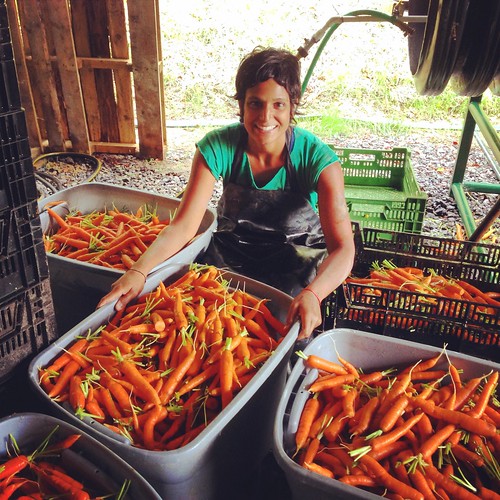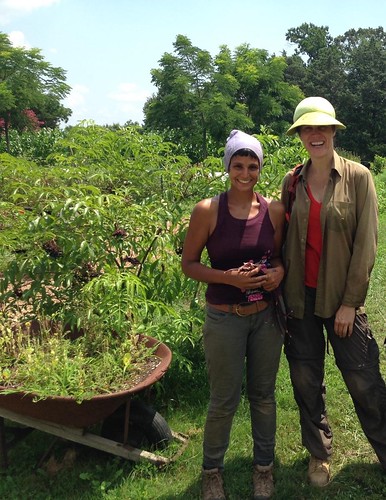
Today in our Women’s Week blog series, we speak with Anita Adalja, the Farm Manager at Arcadia Center for Sustainable Food and Agriculture. A social worker who merged her career with farming, Anita is committed to food access solutions, community building and sustainable land stewardship.
Arcadia is a nonprofit organization dedicated to creating a more equitable and sustainable local food system in the Washington, DC area.
How do you start your day?
I typically start my day by feeding Dandelion, our farm cat, who meets me at my truck as I drive in each morning. From there I walk around the site with my coffee mug in hand, checking on crops and creating the task list for the day. As a non-profit educational farm, we open our fields each day for volunteers to come work alongside us and learn as they weed and harvest, so shortly after I arrive each morning I'm joined by eager individuals wanting to soak up as much as they can about growing.
What inspired you to pursue a career in agriculture?
Before being called to farming, I was a social worker in Brooklyn, NY. While I was working with formerly homeless, mentally ill adults in a supportive housing facility, I co-founded a rooftop farm on top of the building. The transformation in my own work – alongside improvements in the health and well-being with both staff and residents – was tremendous. My commitment to food access, food justice and community building was solidified through this experience. From there, I threw myself into farming by attending an apprenticeship program at the Center for Agroecology and Sustainable Food Systems in Santa Cruz, CA. I haven't looked back since.
What is your favorite part of your job?
I have many favorites to my job – I consider myself to be very lucky! The best aspect of my job is the role Arcadia is playing in increasing food access in the DC-area. Our produce is going out into communities where people have little to no access to fresh produce, and our Mobile Markets are making a huge impact. On a challenging 95 degree day in the middle of summer, knowing that these vegetables are going to folks who need and appreciate them and into communities that have been intentionally ignored for political, racial and socio-economic reasons motivates me to grow more, and to grow better.
Who are your role models in agriculture ?
Margaret Schlass, of One Woman Farm, is my biggest role model in agriculture. I had the privilege of working for her in western Pennsylvania last season, and she is truly an artist. The fields are Margaret's canvas, where she paints with total dedication to the craft, endless positivity, and with both awe and gratitude to the earth. She is unapologetic in her strength and confidence, and she has earned her place among the great farmers in this country.
What do you wish you knew when you were first getting started in agriculture?
I wish I knew and appreciated that every mistake is an opportunity to make changes the next season.
What are you watching, reading or listening to?
I browse through cookbooks during the growing season, looking at all the delicious things that I am going to cook when I have the time in the winter! And as for what's playing in my truck, lately it's been a balance of NPR, Langhorne Slim's latest album, and a "Learn Spanish" podcast.
In seven words or less, what is some advice you would offer your fellow women in agriculture?
Don't ask questions when you already know.


